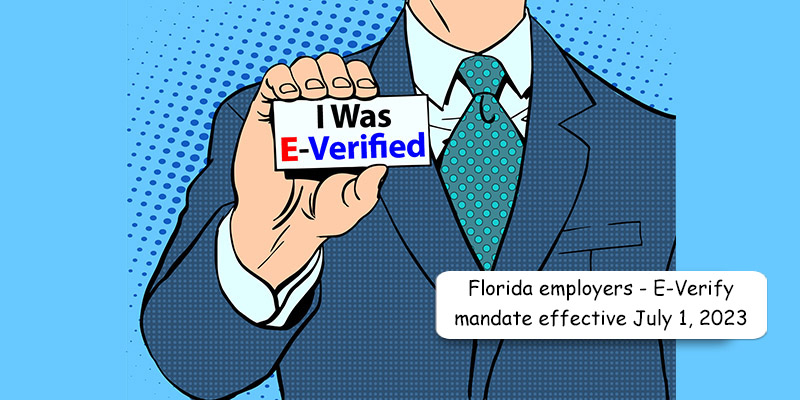Florida Governor Ron DeSantis signed Florida’s Senate Bill 1718 into law on May 10, 2023. This bill has a broad purpose to obstruct the flow of illegal immigration in the state and imposes some of the toughest penalties in the country. It ‘enhances’ the crime of human smuggling, which is a good thing, but imposes a new rule for employers in the state.
Effective July 1, 2023, private employers with 25 or more employees, and public employers, are now required to use the federal E-Verify system to verify employment eligibility of ALL new hires. There is NO requirement to verify employees who began employment prior to that effective date.
So what is E-Verify? It has been around since 1997, when it started as a pilot program to help employers verify the work authorization of new hires. Considering it has been around for over 25 years, there has been a slow adoption by states. In short, the process allows you to submit the information provided by a new hire, on their I-9 form, into a federal database (Department of Homeland Security) to verify whether the individual is legally able to perform work in the U.S. The process must be completed within 3 days of the employee starting to perform work, and my suggestion is to perform the verification prior to any work being performed. Otherwise, if you find out after work is performed, you may have to pay wages to an illegal worker. That comes with its own complications.
Enrollment in E-Verify is performed with the U.S. Department of Homeland Security on their website https://www.e-verify.gov/employers, and verifications are performed at no charge. There is an enrollment process for employers and a short course and test the employer has to pass in order to be approved. Yes, a test!
In addition to employers having to E-Verify new hires, there will also be a requirement to certify its use of the E-Verify system each and every quarter. The certification will be made on the state’s reemployment (aka unemployment) tax return, RT-6. Here is the kicker. If you use payroll service, the service does not have the authority to certify use of the E-Verify system on behalf of the employer. This means that even though the payroll service can continue to file the RT-6 tax return, EVERY employer in the state will also have to file an E-Verify Certification every quarter. We do not know what this form looks like just, yet as the state is still working on creating it. Since the E-Verify law goes into effect at the start of the third quarter, the first time this form will be required to be filed will be in October 2023. For recipients of our newsletter, we will notify you when we find out what this process will look like. Sign up for our newsletter here.
So what happens if you don’t comply? We are not sure what the penalty will be just yet, if you do not submit the quarterly E-Verify Certification, but we do know that employers who fail to verify will have 30 days to cure noncompliance. Those that fail to verify their employees three times in a 24 month period will be fined $1,000 per day, until the employees are verified. Not to mention, if you are caught employing illegal workers, that comes with its own slew of problems.
As of May 2023, the following states have mandated some form of E-Verify.
- Alabama: All employers are mandated.
- Arizona: All employers are mandated.
- Arkansas: All employers with four or more employees are mandated.
- Colorado: All employers with one or more employees are mandated.
- Florida: Effective July 1, 2023, private employers with 25 or more employees and public employers are mandated.
- Georgia: All employers with one or more employees are mandated.
- Idaho: All employers are mandated.
- Indiana: All employers with more than one employee and who are not exempt are mandated.
- Iowa: All employers with four or more employees are mandated.
- Kansas: All employers are mandated.
- Louisiana: All employers with one or more employees are mandated.
- Michigan: All state contractors and subcontractors are mandated.
- Mississippi: All employers are mandated.
- Missouri: All public employers and employers with contracts with public entities are mandated.
- Nebraska: All employers with one or more employees are mandated.
- North Carolina: All employers with more than 25 employees are mandated.
- North Dakota: All public employers are mandated.
- Oklahoma: All employers with one or more employees are mandated.
- Pennsylvania: All public employers and all employers with contracts with public entities are mandated.
- South Carolina: All employers are mandated.
- Tennessee: All employers with six or more employees are mandated.
- Texas: All employers are mandated.
- Utah: All employers are mandated.
- Virginia: All state agencies and public contractors are mandated.
- West Virginia: All employers with five or more employees are mandated.
- Wisconsin: All public contractors and subcontractors are mandated.
- Wyoming: All state contractors and subcontractors are mandated.
While I make every attempt to ensure the accuracy and reliability of the information provided in this article, the information is provided “as-is” without warranty of any kind. They may be additional situations that apply to you that are not mentioned above, and other states that have implemented an E-Verify mandate. PayMaster, Inc and Romeo Chicco do not accept any responsibility or liability for the accuracy, content, completeness, legality, or reliability of the information contained. Consult with your CPA, Labor Attorney, and/or HR Professional to ensure you are in compliance.

